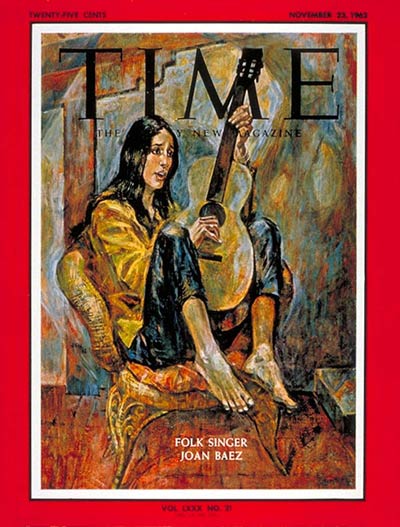
Joan Baez will celebrate her 75th birthday this weekend as one of the most legendary folk singers in American history. As TIME explained in a 1962 cover story written by John McPhee (although without his byline, as was then customary at the magazine), Baez’s connection to folk had little to do with the music’s history or geographic origins. It was all emotion. “I don’t care very much about where a song came from or why or even what it says,” she said. “All I care about is how it sounds and the feeling in it.”
And Baez, even as a very young woman, had a large well from which to draw. The academic career of her father, a physicist, meant she spent her youth moving frequently, and his job took him “to various universities and cities ranging from Los Angeles to Buffalo to Baghdad to Boston and, most recently, Paris, where he is now a consultant for UNESCO,” TIME noted.
Along the way, Baez—whose father was Mexican and mother was English-Scottish—had a chance to experience some of the nation’s most deep-seated problems first-hand. It wasn’t always easy to be a mixed-race girl in the 1940s and ’50s, but the Baez family came up with surprising ways to face that problem, the story explained:
Along the way, young Joan and her two sisters learned some memorable lessons in bigotry. When Dr. Baez was doing military research in Buffalo, for example, he thought it would be a pleasant experience to settle in a small and typical American town. He chose Clarence Center, N.Y. (pop. 900), where the senile old man who was their next-door neighbor scowled at Joan’s dark Mexican skin and said: “Niggers.” The Baezes in turn called the neighbor “Old Bogey.” To keep Old Bogey confused, they sank a plug spout into a telephone pole outside his house and hung a maple-syrup bucket on it. “We knew that he would be full of contempt for our supposed ignorance of maple tapping,” says Dr. Baez, “but we knew that he could not resist peeking into the bucket. We were in stitches of laughter, peeping from our window when he would come by, look around furtively, and peek into the bucket. Then we began to put things in the bucket, water and so on. He was astonished. Poor Old Bogey.”
In Redlands, Calif., Joan found a situation that cut deeper than one old crank. The Mexican schoolchildren there play in separate groups from the “whites.” Observably, the dominant tone of Joan’s personality changed from ebullience to melancholy. Her 13th birthday came, and she said something she would repeat often: “Mummy, I don’t want to grow up.”
She did grow up, but those experiences stuck with her as she used her platform to advocate for peace and equality. Once, the story noted, Baez stopped singing in the middle of a concert in Texas to note the unusually diverse makeup of the crowd.
“They all clapped and cheered,” she was quoted saying. “I was so surprised and happy.”
Read the full story, here in the TIME Vault: Sibyl With Guitar
More Must-Reads from TIME
- Donald Trump Is TIME's 2024 Person of the Year
- TIME’s Top 10 Photos of 2024
- Why Gen Z Is Drinking Less
- The Best Movies About Cooking
- Why Is Anxiety Worse at Night?
- A Head-to-Toe Guide to Treating Dry Skin
- Why Street Cats Are Taking Over Urban Neighborhoods
- Column: Jimmy Carter’s Global Legacy Was Moral Clarity
Write to Lily Rothman at lily.rothman@time.com